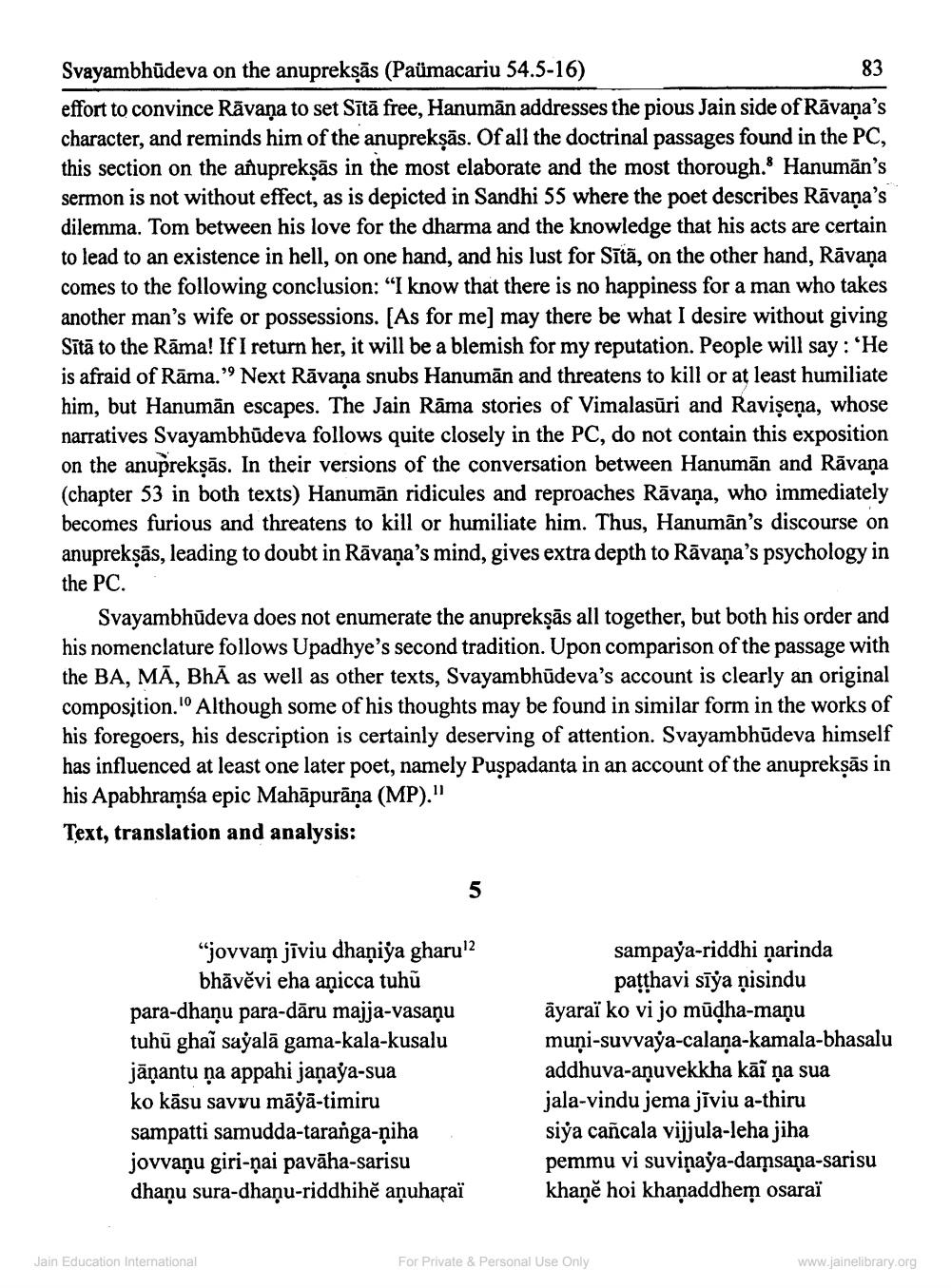________________
Svayambhūdeva on the anupreksās (Paümacariu 54.5-16)
83 effort to convince Rãvana to set Sītā free, Hanumān addresses the pious Jain side of Rāvana's character, and reminds him of th anupreksās. Of all the doctrinal passages found in the PC, this section on the añuprekşās in the most elaborate and the most thorough. Hanumān's sermon is not without effect, as is depicted in Sandhi 55 where the poet describes Rāvana's dilemma. Tom between his love for the dharma and the knowledge that his acts are certain to lead to an existence in hell, on one hand, and his lust for Sītä, on the other hand, Rāvan comes to the following conclusion: “I know that there is no happiness for a man who takes another man's wife or possessions. (As for me, may there be what I desire without giving Sītā to the Rāma! If I return her, it will be a blemish for my reputation. People will say: 'He is afraid of Rāma." Next Rāvana snubs Hanumān and threatens to kill or at least humiliate him, but Hanuman escapes. The Jain Rāma stories of Vimalasūri and Ravişeņa, whose narratives Svayambhūdeva follows quite closely in the PC, do not contain this exposition on the anuprekşās. In their versions of the conversation between Hanumān and Rāvana (chapter 53 in both texts) Hanumān ridicules and reproaches Rāvaņa, who immediately becomes furious and threatens to kill or humiliate him. Thus, Hanumān's discourse on anuprekṣās, leading to doubt in Rāvana's mind, gives extra depth to Rāvana's psychology in the PC.
Svayambhūdeva does not enumerate the anuprekşās all together, but both his order and his nomenclature follows Upadhye's second tradition. Upon comparison of the passage with the BA, MĀ, Bhā as well as other texts, Svayambhūdeva's account is clearly an original composition. Although some of his thoughts may be found in similar form in the works of his foregoers, his description is certainly deserving of attention. Svayambhūdeva himself has influenced at least one later poet, namely Puspadanta in an account of the anupreksās in his Apabhramsa epic Mahāpurāņa (MP)." Text, translation and analysis:
5
"jovvam jīviu dhaņiya gharu'2
bhāvěvi eha aņicca tuhũ para-dhaņu para-dāru majja-vasaņu tuhũ ghai sayalā gama-kala-kusalu jāņantu ņa appahi janaya-sua ko kāsu savvu mājā-timiru sampatti samudda-taranga-piha jovvaņu giri-ņai pavāha-sarisu dhaņu sura-dhaņu-riddhihě aņuharaï
sampaya-riddhi narinda
patthavi sīja Ņisindu āyaraï ko vi jo mūờha-maņu muni-suvvaya-calana-kamala-bhasalu addhuva-aņuvekkha kās ņa sua jala-vindu jema jīviu a-thiru siya cañcala vijjula-leha jiha pemmu vi suviņaya-daņsaņa-sarisu khaně hoi khanaddhem osaraï
Jain Education International
For Private & Personal Use Only
www.jainelibrary.org




